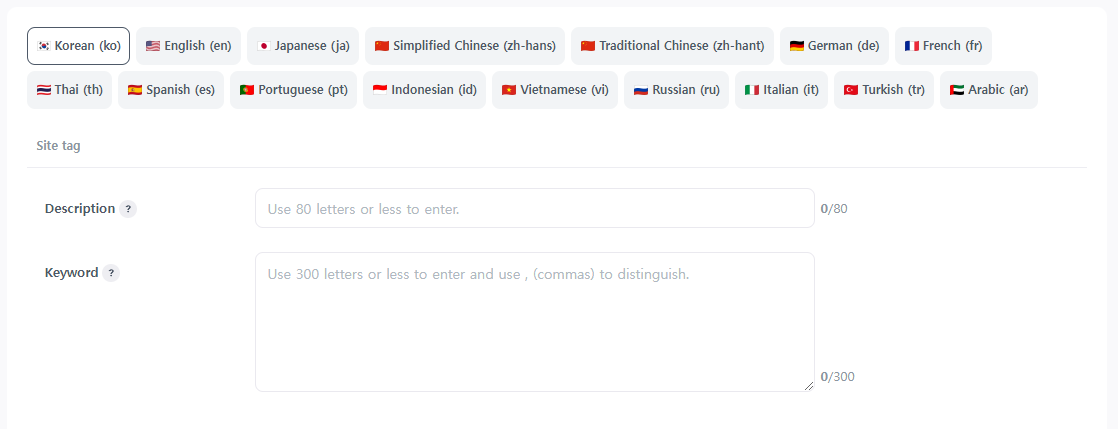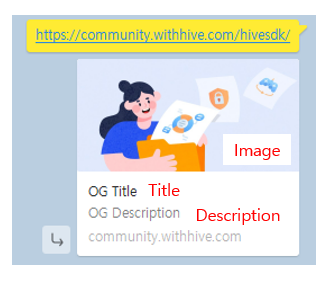SEO setting
SEO Definition¶
SEO refers to the process of optimizing search engines so that a website appears at the top of search results on portal sites.
Visibility in search results is increased and increases traffic naturally which will help with increasing the number of visitors.
It is often used as a marketing strategy because it can achieve similar effects to paid search advertising without the cost.
Search Engines and Collected Data¶
Search engines use search robots to collect and index web pages and reflect them in search results.
The data collected to be reflected in SEO can be broadly classified into three categories.
| Collected Data | Definition | Characteristics |
| Meta Data |
|
|
| Sitemap sitemap.xml |
|
|
| robots.txt |
|
|
SEO Settings¶
Enable SEO optimization by simply entering keywords without the server deployment process.
Marketers and community managers can easily perform SEO tasks without the help of a development team.
Automatic SEO Setting¶
When creating a community, meta tags are instantly applied to the page source (HTML) to allow search bots to crawl. The automatically set tags are divided into the following two types.
- Meta tags commonly used in SEO that do not require keyword input.
- Meta tags that require keyword input and can be manually adjusted by the administrator on the SEO settings page.
Automatic Setting Tags 1 (No Keyword Input Required)¶
Commonly used meta tags required for SEO are automatically reflected.
| Meta tags that were automatically submitted | Details |
| <meta name="robots" content="index,follow" /> | Instructs the web page's search engine crawler (bot) to add the community site to the index. |
| <meta name="googlebot" content="indexifembedded" /> | Instructs Googlebot, the crawler of the Google search engine, to add the community site to the index. |
| <link rel="canonical" href="https://community.withhive.com/(Game Name)" /> | The community main page URL is defined as a standard URL in search engines. |
| <link rel="alternate" href="https://community.withhive.com/(Game Name)/(Language)" hreflang="(Language)"> | If rel="canonical" defines a standard page, rel="alternate" defines a multilingual page. The language is changed to match the language used by the community. |
| <meta property="og:url" content="https://community.withhive.com/(Game Name)" /> | As part of the OG (Open Graph) protocol, it instructs to refer to the community URL. |
| <meta property="og:type" content="website"> | As part of the OG (Open Graph) protocol, it defines that the community site is a regular web page. |
| <meta property="og:locale" content="(Language)"> | As part of the OG (Open Graph) protocol, it helps you gain exposure in the selected language on social media platforms. |
- The game name and language are reflected as unique identifiers for the community.
- Please check the Open Graph Tag section for more information about the OG protocol.
- You can check if the meta tags are reflected by looking at the community page source.
- View page source in Chrome browser: [ctrl + U] or [right-click on the page and click View page source]
Automatic Setting Tag 2 (Keyword Input Required)¶
The game name and image registered in the App Center are used as default values for meta information.
This is applied once during community creation, and administrators can modify these meta tags anytime on the SEO settings page.
Meta Information Locations Retrieved from the App Center¶
- Title
- App Center > Manage Project > Game Details > Game Asset > Language support/Title per language
- Image
- App Center > Manage Project > Game Details > Game Asset > Language support/Title per language > Game Image
Note
Languages are referenced in the order of English > Default language.
SEO Settings Modification¶
You can freely modify the content of Automatic Setting Tag 2 on the SEO settings page.
When you enter marketing keywords on the SEO settings page, they are instantly reflected in the page source.
(Please note that the example image represents the default value applied during the initial creation of the community.)
Site Tag¶
You can register information representing the game community site in the site tag. Site tags classify pages by language, so please register them for each site that operates a community.
The entered keywords are reflected in the content area of the example code.
| Tag | Description | Example |
| Description |
| <meta name="description" content="Enjoy real baseball with MLB license!."> |
| Keyword |
| <meta name="keywords" content="Walking Dead, Forum" /> |
Open Graph Tag¶
You can set the information displayed when a community link is shared on social media platforms in Open Graph tags
This applies to the title, description, and image information provided in the preview function.
Sites are classified by language, so please register them for each site that operates a community.
The entered keywords are reflected in the content area of the example code.
| Tag | Purpose | Example |
| Title |
| <meta property="og:title" content="The Walking Dead Match 3 Tales" /> |
| Description |
| <meta property="og:description" content="Die Community hat die neuesten Infos zum Spiel, inkl." /> |
| Image |
|
|
Note
- When sharing a link to a detailed post, the title and image of that post are used in the Open Graph tags.
- The preview feature for Open Graph tags will only function correctly if supported by the social media platform.
- Open Graph tags are affected by caching, so some SNS platforms may not immediately reflect the changes.
Advanced (Google Ownership Tag)¶
Community supports setting Google ownership tags for using Google Search Console.
When using Google Search Console, you can monitor search traffic and diagnose site problems.
More information about site ownership can be found here.
SEO File Creation and Update¶
When creating a community, the sitemap.xml and robots.txt files are automatically generated.
The sitemap.xml file, which needs to be kept up-to-date, is automatically updated every week.
| Data Collected | Required Actions | Notes |
| Sitemap sitemap.xml |
|
|
| robots.txt |
|
|






